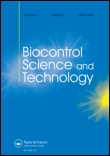
BIOCONTROL SCIENCE AND TECHNOLOGY
metrics 2024
Exploring Cutting-Edge Research in Biocontrol Science
Introduction
BIOCONTROL SCIENCE AND TECHNOLOGY is a premier, peer-reviewed journal published by Taylor & Francis Ltd that specializes in the dynamic fields of Agronomy and Insect Science. Established in 1991, this journal has garnered a reputation for disseminating high-quality, impactful research with an impressive 2023 Scopus rank of 53 out of 181 in Insect Science and 153 out of 406 in Agronomy, placing it in the Q2 category for both fields. With its ISSN 0958-3157 and E-ISSN 1360-0478, the journal serves as a vital resource for researchers, professionals, and students dedicated to advancing understanding and innovation in pest management and biocontrol strategies. Although not an open-access journal, it offers comprehensive insights that are crucial for professionals aiming to tackle agricultural challenges and enhance food security. The journal’s continuous coverage from 1991 to 2024 ensures that it remains at the forefront of significant advancements in biocontrol, making it an essential read for anyone interested in sustainable agricultural practices and integrated pest management.
Metrics 2024
 0.46
0.46 1.50
1.50 1.90
1.90 69
69Metrics History
Rank 2024
Scopus
IF (Web Of Science)
JCI (Web Of Science)
Quartile History
Similar Journals
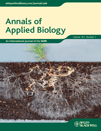
ANNALS OF APPLIED BIOLOGY
Cultivating knowledge for the next generation of agronomists.Annals of Applied Biology, published by Wiley, stands as a pivotal resource in the fields of Agronomy and Crop Science, boasting an impressive impact factor that reflects its significance and influence in the academic community. With a storied history dating back to 1914, this journal serves as a comprehensive platform for innovative research and applied studies in agricultural biology, specifically aimed at improving crop production and sustainable practices. Currently categorized in the Q1 quartile for Agronomy and Crop Science in 2023, it ranks an admirable 82 out of 406 in the Scopus database, placing it within the top 79th percentile of its category. Researchers, professionals, and students worldwide rely on the Annals of Applied Biology for cutting-edge insights and advancements in applied biological research, making it a vital component of the scientific discourse aimed at addressing pressing agricultural challenges. Please note that this journal does not offer open access options, thus ensuring a rigorous peer review process and the integrity of published work.
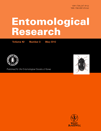
ENTOMOLOGICAL RESEARCH
Connecting Research to Real-World Insect ChallengesENTOMOLOGICAL RESEARCH, published by Wiley, is a prominent journal within the field of Insect Science, with a significant focus on advancing our understanding of entomological studies, including pest management, biodiversity, and ecological impacts of insects. Since its inception in 2007, the journal has served as a vital platform for researchers and practitioners to publish high-quality, peer-reviewed articles that contribute to the growing body of knowledge in this essential discipline. With an H-index illustrating its citation impact and its classification in the 2023 Scopus quartile rankings at Q3, ENTOMOLOGICAL RESEARCH ranks 69 out of 181 journals in its field, positioning itself within the 62nd percentile, which underscores its relevance and contribution to agricultural and biological sciences. Although it does not offer Open Access, the journal remains committed to ensuring that its content reaches the widest possible audience, supporting ongoing discoveries and innovations in insect science. For researchers, professionals, and students seeking to remain at the forefront of entomological advancements, ENTOMOLOGICAL RESEARCH is an indispensable resource.

Romanian Agricultural Research
Fostering Dialogues for Sustainable Agricultural DevelopmentRomanian Agricultural Research is a prominent academic journal dedicated to advancing the field of agricultural science with a specific focus on agronomy and crop management. Published by the NATL AGRICULTURAL RESEARCH & DEVELOPMENT INST in Romania, this journal has established itself as an important resource within its discipline, evidenced by its Q3 ranking in the Agronomy and Crop Science category for 2023. With its ongoing publication since 2008, the journal provides a platform for researchers and professionals to disseminate their findings and share innovative practices that address the challenges faced in agricultural development. Although it operates under a non-open access model, Romanian Agricultural Research commits to rigorous peer-review processes, ensuring the high-quality content that enhances the academic community’s knowledge base. The journal's objective is to foster dialogues surrounding sustainable agriculture, improve crop yield, and contribute to the enhancement of agricultural practices globally. Researchers, professionals, and students will find this journal to be an invaluable repository of knowledge and a catalyst for future agricultural innovations.

PLANT PROTECTION SCIENCE
Advancing sustainable agriculture through innovative research.PLANT PROTECTION SCIENCE, published by the Czech Academy Agricultural Sciences, is an esteemed journal dedicated to advancing the field of agronomy, crop science, and soil science. With a strong open access policy since 2007, this journal has made significant contributions to the dissemination of research relevant to plant protection, sustainable agriculture, and environmental preservation. Operating from Prague, Czech Republic, it has successfully positioned itself within the Q2 category in Agronomy and Crop Science and Q3 in Soil Science as of 2023, highlighting its relevance and influence in these vital areas of agricultural research. According to Scopus, its rankings reflect a respectable standing, with percentile ranks of 58th in Agronomy and Crop Science and 53rd in Soil Science. Researchers, professionals, and students are encouraged to explore its rich repository of peer-reviewed articles, which aim to address critical challenges in plant health and production, thereby fostering innovation in agricultural practices.
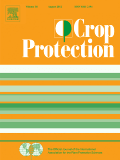
Crop Protection
Innovating pest management for a resilient future.Crop Protection is a leading academic journal in the field of Agronomy and Crop Science, published by Elsevier Science Ltd, and recognized for its high impact demonstrated by an impressive Q1 quartile ranking in 2023. With its ISSN 0261-2194 and E-ISSN 1873-6904, this esteemed publication has been a crucial source of research since its inception in 1982, continuing to provide valuable insights and advancements in crop protection strategies through 2024. The journal serves a diverse audience, including researchers, professionals, and students, eager to explore pioneering findings in pest management, herbicide development, and sustainable agricultural practices. While the journal does not offer open access options, its rigorous peer-review process ensures the highest quality of scholarly articles that contribute significantly to the agricultural and biological sciences, maintaining its respected position with a Scopus rank of #63 out of 406 in its category, placing it in the 84th percentile. Engaging with Crop Protection not only enriches knowledge but also promotes innovative solutions for global agricultural challenges.
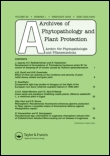
ARCHIVES OF PHYTOPATHOLOGY AND PLANT PROTECTION
Uncovering Insights to Protect Our Crops and EnvironmentArchives of Phytopathology and Plant Protection, published by Taylor & Francis Ltd, stands as a pivotal platform in the field of agronomy and crop science since its inception in 1974. With an ISSN of 0323-5408 and E-ISSN of 1477-2906, this journal is dedicated to publishing high-quality, peer-reviewed research that addresses contemporary challenges in plant pathology and protection. As a Q3 ranked journal in its category with Scopus Rank #210/406, it serves a vital role in disseminating practical solutions and innovative discoveries to enhance agricultural productivity and sustainability. The journal fosters a rich exchange of ideas among researchers, professionals, and students, empowering them to contribute to the advancement of the agronomy and biological sciences. Despite being traditionally subscription-based, the journal's commitment to comprehensive and rigorous research makes it an essential resource for anyone invested in the future of plant health and agricultural innovation.
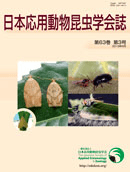
JAPANESE JOURNAL OF APPLIED ENTOMOLOGY AND ZOOLOGY
Empowering Entomological Discoveries for a Greener FutureJapanese Journal of Applied Entomology and Zoology is a premier publication in the field of Insect Science, offering a platform for researchers and practitioners to share their findings on applied entomology and zoology. Established in 1957 and published by the Japan Society of Applied Entomology and Zoology, this journal aims to foster the understanding of insect-related studies that impact agriculture, ecology, and biodiversity. With an ISSN of 0021-4914 and E-ISSN of 1347-6068, it serves as a crucial resource for both academics and industry professionals. While the journal currently resides in the Q4 category of the Scopus ranking for Insect Science with a percentile of 11th, it plays a significant role in providing valuable insights into insect behavior, systematics, and their ecological roles. Readers can benefit from its published research to drive innovations and solutions in pest management and conservation practices. As the journal continues to evolve, it reinforces its commitment to disseminating critical research that supports sustainable practices in entomology and zoology through its convergence extending to the year 2024.

PEST MANAGEMENT SCIENCE
Advancing Sustainable Solutions in Pest ManagementPEST MANAGEMENT SCIENCE, published by John Wiley & Sons Ltd, stands as a leading journal in the realms of agronomy, crop science, and insect science. With an impressive Q1 ranking in these disciplines, as well as in miscellaneous medicine, this journal boasts a commendable influence within the academic community, reflected by its position within the top percentiles of Scopus rankings—ranked #7 out of 181 in Insect Science and #43 out of 406 in Agronomy and Crop Science. Covering a broad spectrum of pest management strategies and methodologies, it serves as an essential resource for researchers and professionals aiming to advance their knowledge and practices in sustainable agriculture and pest control. The journal’s commitment to open access ensures that cutting-edge research is widely disseminated, contributing significantly to global agricultural productivity and ecological sustainability. With coverage extending from 2000 to 2024, PEST MANAGEMENT SCIENCE remains pivotal in shaping the future of pest management.
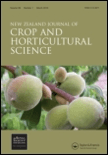
NEW ZEALAND JOURNAL OF CROP AND HORTICULTURAL SCIENCE
Pioneering Research for Tomorrow's Agricultural ChallengesThe New Zealand Journal of Crop and Horticultural Science, published by Taylor & Francis Ltd, stands as a key resource in the fields of Agronomy and Horticulture, with a commendable impact factor reflecting its quality and influence in the scientific community. Since its inception in 1989, this journal has been committed to advancing our understanding of crop development and horticultural practices, catering not only to researchers and professionals but also to students eager to delve into the intricacies of plant sciences. With a Q3 ranking in both Agronomy and Crop Science and Horticulture as of 2023, the journal occupies a significant position within the agricultural and biological sciences domain, significantly contributing to the body of knowledge in these fields. The journal features original research, reviews, and technical notes that cover a wide range of topics, ensuring a comprehensive perspective on contemporary and emerging agricultural issues. For individuals interested in accessing cutting-edge research, the journal provides subscription-based access, further enhancing its scholarly contributions.

Pesquisa Agropecuaria Tropical
Empowering innovation in agronomy and crop science.pesquisa Agropecuaria Tropical is a premier Open Access journal dedicated to advancing the knowledge and practices within the field of agronomy and crop science. Since its inception in 1971, this peer-reviewed journal, published by the Universidade Federal de Goiás, has played a pivotal role in disseminating high-quality research from Brazil and beyond. Operating under an Open Access model, it ensures that scholarly articles are freely accessible, thereby fostering greater collaboration and innovation. With a Scopus ranking placing it in the 32nd percentile among its peers in agricultural and biological sciences, and a current classification in the Q3 category of agronomy and crop science, the journal serves as an essential resource for researchers, professionals, and students alike. As it continues its publication journey from 2010 to 2024, it remains committed to contributing valuable insights and advancements in the agricultural sector, ultimately influencing sustainable practices and food security.